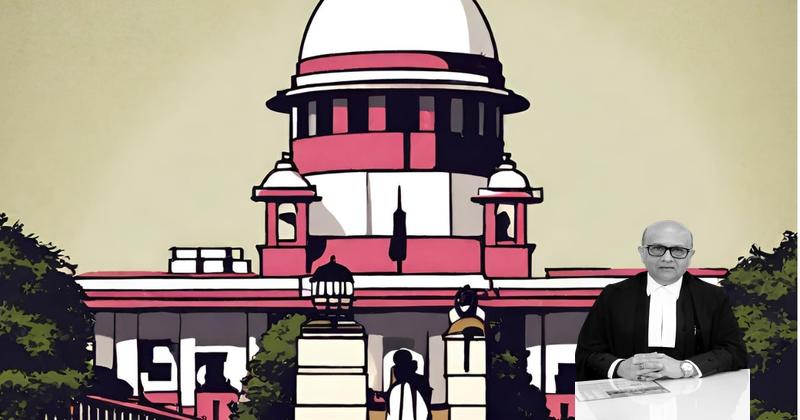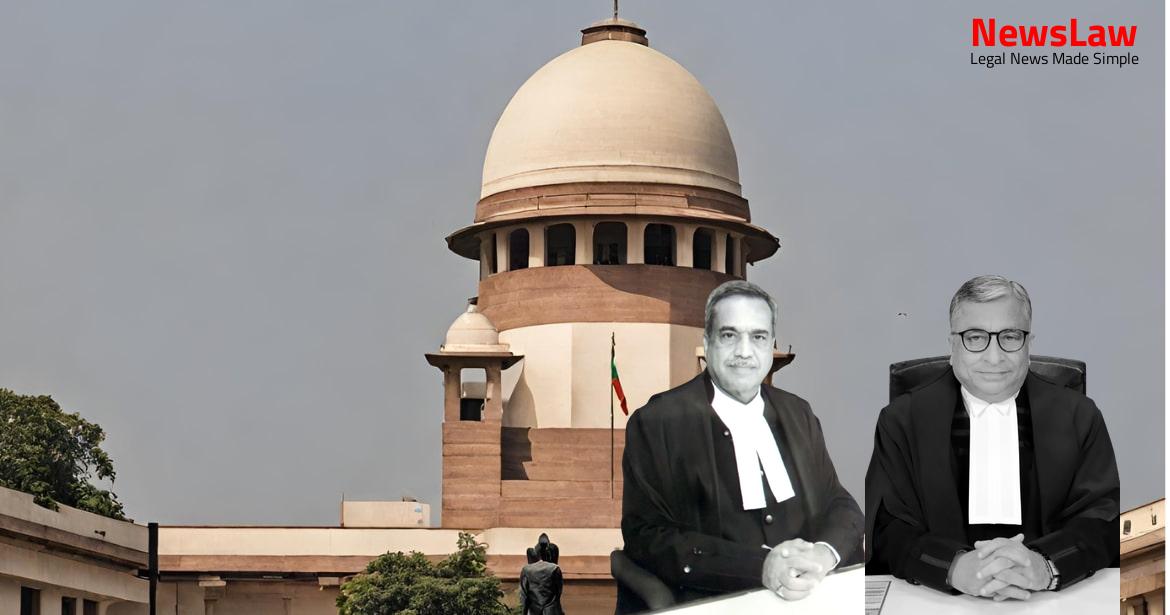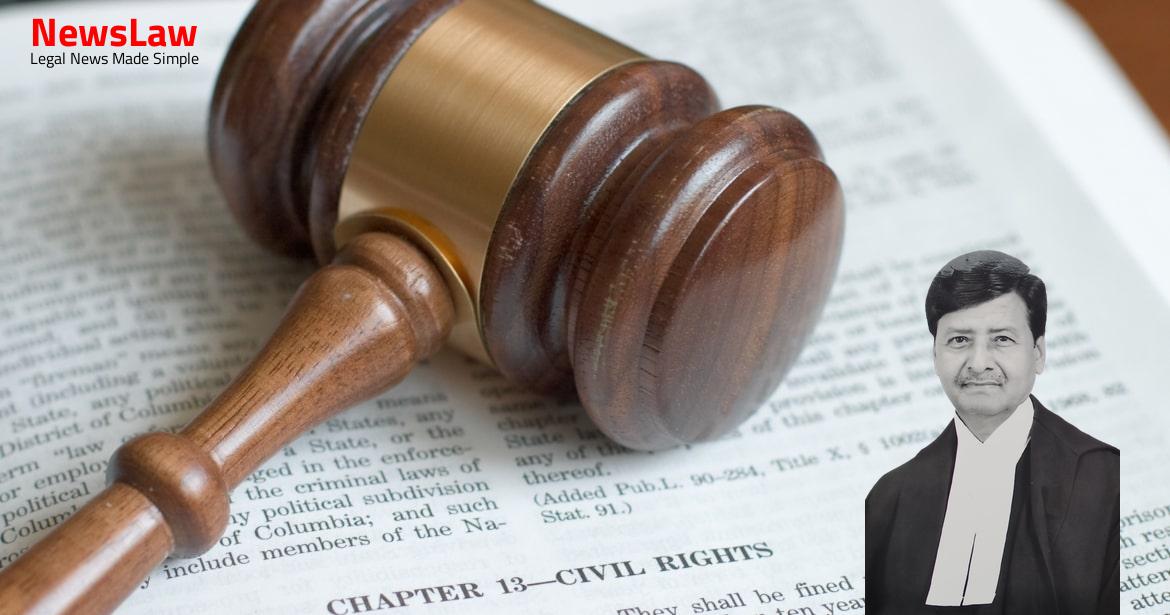The facts leading to the present appeal in nutshell are as under: 2.1 The respondent – assessee was engaged in the business of manufacture, supply and erection at the site of prefabricated/pre-engineered steel buildings and parts thereof classifiable under the relevant Headings/sub-headings of the First Schedule to the Central Excise Tariff Act, 1985. The unit at Greater Noida registered as a Centralized Service Provider, availed CENVAT Credit (i) Excise duty paid by the units at the time of removal (ii) duty paid on capital goods (iii) service tax paid on input services. Therefore, according to the Revenue on classifiable service under ‘works contract service’ the respondents availed CENVAT Credit on Central Excise duty paid on inputs.
The respondent was called upon to show cause as to why the services being provided by them be reclassified under “Works Contract Service” in place of “Commercial or Industrial Construction Services”, inadmissible CENVAT Credit of building material amounting to Rs.112,60,92,760/- be disallowed in terms of Rules 2 & 3(1) of CENVAT Credit Rules, 2004; an amount of Rs.22,37,01,811/- on account of short paid Service Tax towards the liability debited from the inadmissible Cenvat Credit on construction materials be recovered under Section 73(1) of the Act, 1994; an amount of Rs.90,23,90,907/- alleged to have been collected as cash in excess of the Service Tax assessed/determined by passing the inadmissible CENVAT Credit to their recipients of taxable service be demanded under Section 73A of the Act, 1994 along with the appropriate rate of interest under Sections 73B and 75 of the Act and the penalties be imposed under Sections 77 & 75 of the Act, 1994 read with Rule 15(3) of CENVAT Credit Rules, 2004. 6 By order dated 18.11.2015, the learned Tribunal set aside the adjudication order and remanded the matter back to the adjudicating authority with the direction that the tax liability be re-determined after hearing the respondent. (ii)
The provision of Rule 2A of Service Tax (Determination of Value) Rules, 2006, start with expression “subject to the provisions of Section 67” which means the provision prescribed under said Rule 2A, is subject to the provisions of Section 67 of the Finance Act, 1994. (iv) Section 67 of the Finance Act, 1994 provides for arriving at assessable value which states “subject to the provisions of this Chapter, where Service Tax is chargeable on any taxable service with reference to its value, then such value shall in a case where the provision of service is for a consideration in money, be the gross amount charged by the service provider for such service provided or to be provide by him.” Therefore, the said provision which is fundamental in nature and is applicable to any taxable service.
Jiwani (supra) and the grounds on which Id, Commissioner distinguished the judgment are invalid.” 8
By the impugned judgment and order the learned Tribunal has allowed the appeal preferred by the respondent and has set aside the Order-in-Original passed by the adjudicating authority by observing that the composition scheme is optional and the provisions of Rule 2A of the said Rules are subject to provisions of Section 67 of the Act, 1994. Venkataraman, learned ASG appearing on behalf of the Revenue has made the following submissions challenging the correctness and legality of the impugned order passed by the CESTAT: (i) That the period under dispute is January, 2007 to March, 2014. 2 It is submitted that however, for the period commencing 01.06.2007 to 31.03.2014 the demands are sustainable and the Orders-in- Original need to be restored. Rule 2A has been inserted vide notification 29/2007 dated 22.05.2007 w.e.f. Explanation.-
For the purposes of this rule,- (a) gross amount charged for the works contract shall not include Value Added Tax (VAT) or sales tax, as the case may be, paid, if any, on transfer of property in goods involved in the execution of the said works contract; (b) value of works contract service shall include,- (i) labour charges for execution of the works; (ii) amount paid to a sub-contractor for labour and services; (iii) charges for planning, designing and architect’s fees; (iv) charges for obtaining on hire or otherwise, machinery and tools used for the execution of the works contract; (v) cost of consumables such as water, electricity, fuel, used in the execution of the works contract; (vi) cost of establishment of the contractor relatable to supply of labour and services; (vii) other similar expenses relatable to supply of labour and services; and (viii) profit earned by the service provider relatable to supply of labour and services; (ix) Where Value Added Tax or sales tax, as the case may be, has been paid on the actual value of transfer of property in goods involved in the execution of the works contract, (1) Notwithstanding anything contained in section 67 of the Act and rule 2A of the Service (Determination of Value) Rules, 2006, the person liable to pay service tax in relation to works contract service shall have the option to discharge his service tax liability on the works contract service provided or to be provided, instead of paying service tax at the rate specified in section 66 of the Act, by paying an amount equivalent to two per cent of the gross amount charged for the works contract. Valuation of taxable services for charging Service Tax – 1) Subject to the provisions of this Chapter, service tax chargeable on any taxable service with reference to its value shall, – (i) in a case where the provision of service is for a consideration in money, be the gross amount charged by the service provider for such service provided or to be provided by him; (ii) in a case where the provision of service is for a consideration not wholly or partly consisting of money, be such amount in money, with the addition of service tax charged, is equivalent to the consideration; (iii) in a case where the provision of service is for a consideration which is not ascertainable, be the amount as may be determined in the prescribed manner. (2) Where the gross amount charged by a service provider, for the service provided or to be provided is inclusive of service tax payable, the value of such taxable service shall be such amount as, with the addition of tax payable, is equal to the gross amount charged. (c) “gross amount charged” includes payment by cheque, credit card, deduction from account and any form of payment by issue of credit notes or debit notes and [book adjustment, and any amount credited or debited, as the case may be, to account any, whether called “Suspense account” or by any other name, in the books of account of a person liable to pay service tax, where the transaction of taxable service is with any associated enterprise. Rule 2A of Service Tax (Determination of Value) Rules, 2006 [Notification No.29/2007-Service tax, dated 22.05.2007], provides that value of works contract service shall be equivalent to the gross amount charged for the works contract less the value of transfer of property in goods involved in the execution of the said works contract. It has also been explained that value of works contract service shall include: (i) labour charges for execution of the works; (ii) amount paid to a sub- contractor for labour and services; (iii) charges for planning, designing and architect’s fees; (iv) charges for obtaining on hir or otherwise, machinery and tools uses for the execution of the works contract; (v) cost of consumables such as water, electricity, fuel, used in the execution of the works contract, the property in which is not transferred in the course of execution of works contract; (vi) cost of establishment of the contract relatable to supply of labour and services; (vii) other similar expenses relatable to supply of labour and services; and (viii) profit earned by the service provider relatable to supply of labour and service; 9.4 If the gross amount charged for the works contract is inclusive of VAT or sales tax, the value for the purposes of service tax shall be computed as follows: [Gross amount charged – (value of transfer of property in goods involved in the execution of works contract and VAT or sales tax paid, if any, on the said transfer of property in goods involved in the execution of said works contract)]. 6 The scheme provides that the service provider shall have an option to pay an amount equivalent to 2% of the gross amount charged for the works contract instead of paying service tax at the rate specified in section 66. A composite works contract gets vivisected into transfer of property into goods liable to sales tax/VAT in terms of Article 366 (29A)(b) of the Constitution of India and the service portion liable to service tax w.e.f. The value of the goods involved in the execution of a works contract will, therefore, have to be determined by taking into account the value of the entire works contract and deducting therefrom the charges towards labour and services which would cover— ( a ) Labour charges for execution of the works; ( b ) amount paid to a sub-contractor for labour and services; ( c ) charges for planning, designing and architect’s fees; ( d ) charges for obtaining on hire or otherwise machinery and tools used for the execution of the works contract; ( e ) cost of consumables such as water, electricity, fuel, etc. 13 It is submitted that consequently this Court while dealing with the decision of Larsen and Toubro (supra) had specifically addressed this issue by bringing the similarity of the service elements as mentioned in Constitution Bench’s decision in Gannon Dunkerly (supra) and framed as Rule 2A of the Valuation Rules, 2006. While appreciating the prayer/submission made on behalf of the Revenue to re-consider the binding decision of this Court in the case of Larsen and Toubro Limited (supra) and to refer the matter to the Larger Bench, few facts are required to be taken into consideration, which are as under:— (i) The decision of this Court in the case of Larsen and Toubro Limited (supra) has been delivered/passed in the year 2015, in which, it is specifically observed and held that on indivisible works contracts for the period pre-Finance Act, 2007, the service tax was not leviable; (ii) After considering the entire scheme and the levy of service tax pre-Finance Act, 2007 and after giving cogent reasons, a conscious decision has been taken by this Court holding that the service tax was not leviable pre-Finance Act, 2007 on indivisible/Composite Works Contracts; (iii) While holding that for the period pre- Finance Act, 2007, on indivisible/Composite Works Contracts, the service tax is not leviable, number of decisions have been dealt with and considered by this Court in the aforesaid decision; (iv) That subsequently, the decision of this court in the case And Ors, (2018) 3 SCC 782, ; (v) That after the decision of this Court in the case of Larsen and Toubro Limited (supra) rendered in the year 2015, the said decision has been consistently followed by various High Courts and the Tribunals; (vi) The decisions of the various High Courts and the Tribunals, which were passed after following the decision of this Court in the case of Larsen and Toubro Limited (supra) have attained finality and in many cases, the Revenue has not challenged the said decisions; (vii) No efforts were made by the Revenue to file any review application to review and/or recall the judgment and order passed by this Court in the case of Larsen and Toubro Limited (supra).
It is submitted that this Court in the case of Larsen and Toubro (supra) as reiterated in Total Environment Building (supra) has made it clear that the goods value in the nature of transfer of property of goods would suffer sales tax/VAT and the service components or elements would suffer service tax w.e.f. 17
Also Read: https://newslaw.in/case-type/criminal/analysis-of-bail-granting-criteria-in-criminal-cases/
It is submitted that this Court in the case of Larsen and Toubro (supra) vide para 25 had referred to Rule 2A of the Valuation Rules, 2006 and its purport by holding that the said Rule goes on to say that the service component of the works contract is to include the 8 elements laid down in the second Gannon Dunkerly’s case and the value attributable to the service in the works contract would be the service elements in such contracts as this scheme alone would comply with the constitutional requirements as it seeks to bifurcate a composite indivisible works contract and takes care to see that no element is attributable to the property in goods transferred pursuant to such contract enters into the computation of the service tax. 18 No so far as the composition scheme is concerned, it is submitted that the assessee falling under the definition of ‘works contract service’ from 01.06.2007 has to discharge service tax liability either under Rule 2A of the valuation rules only on the service components without taking any CENVAT Credit on the input goods or go for the option of a composition scheme in which case the rates of tax specified at various points of time should have been complied with on the total contract value. It is submitted that the invented method of the respondent – assessee by seeking to pay service tax on entire contract value after taking the CENVAT Credit on the input goods is clearly unsustainable in law. It is submitted that even the circular dated 22.05.2005 makes it amply clear as to how a works contract service needs to be taxed and vide para 9.2 referred to Rule 2A of the Valuation Rules, 2006 to affirm that the value of works contract service shall be equivalent to the gross amount charged for the works contract less the value of transfer of property in goods involved in the execution of the said contract and vide para 9.3 rings out the elements of services which matches exactly with the elements laid down by this Court in the case of Dunkerly (supra).
1
While opposing the present appeal and in support of the impugned order passed by the CESTAT, learned counsel appearing on behalf of the respondent has made the following submissions: (i) That the composition scheme is optional as per Rule 3(1) of the Composition Rules; (ii) Provisions of Rule 2A of the Valuation Rules are subject to the provisions of Section 67 of the Finance Act, 1994; (iii) Once the provisions of Section 67 of the Finance Act, 1994 have been complied with, neither the question of applicability of Rule 2A of the Valuation Rules arise nor was there any question of forcibly applying option of Composition Scheme on the assessee; (iv) Even if the services of the respondent are considered as classifiable under ‘works contract service’ after 1 June, 2007, as claimed by the Revenue, the further claims of the Revenue that there were only two options as above for valuation of the works contract service namely the composition rules and the Rule 2A of the Valuation Rules available to the assessee and consequential non-admissibility of CENVAT Credit has no merit.
It is submitted that in the said case it was held that the composition rules and Rule 2A of the Valuation Rules are merely options provided to the service provider to discharge of service tax liability vis–vis options available in Section 67 of the Finance Act, 1994. (ii) Rule 2A of the Valuation Rules: to pay service tax at the full applicable rate on the taxable value as determined in terms of Rule 2A of the Valuation Rules. 7 It is submitted that in this case the assessee would be eligible to full CENVAT Credit and input, input services and capital goods under CENVAT Credit Rules, 2004 OR to pay service tax under the head construction services by opting for abatements specified in Notification under 15/2004 – HT, as amended from time to time or replaced with new notification; OR to pay service tax under the head ‘works contract services’ either in terms of Rule 2A of the Valuation Rules or in terms of the Composition Rules.
8 It is further submitted that the words used in Rule 2A ‘subject to Section 67’ conveys the clear idea that the valuation done under Section 67 is supreme and the rules are subject to the Act. The short question which is posed for consideration before this Court is as to whether an assessee who is liable to pay service tax under works contract service has the legal right not to follow Rule 2A of the Service Tax (Determination of Value) Rules, 2006 nor the Composition Scheme on the ground that in terms of Section 67 of the Finance Act, 1994 an assessee is entitled to take the total contract value which includes both goods and services and remit service tax on the entire value as works contract service and in the process also entitled to avail the CENVAT Credit? used in the execution of the works contract the property in which is not transferred in the course of execution of a works contract; and ( f ) cost of establishment of the contractor to the extent it is relatable to supply of labour and services; ( g ) other similar relatable expenses to supply of labour and services; ( h ) profit earned by the contractor to the extent it is relatable to supply of labour and services. 5 In light of the above now the next main question posed for consideration before this Court is required to be considered namely whether despite Rule 2A of the Service Tax (Determination of Value) Rules, 2006 and the Composite Scheme still the assessee is entitled to take the total contract value which includes both goods and services in terms of Section 67 of the Act, 1994 and remit service tax on the entire value as works contract service and the assessee is also entitled to avail CENVAT Credit? Post 01.07.2012
as per Rule 2A value of service portion in the execution of a works contract shall be determined taking into consideration the value of service portion in the execution of a works contract equivalent to the gross amount charged for the works contract less the value of property of goods transferred in the execution of the said works contract.
7 However, as per the Composition Scheme vide notification 32/2007 – ST dated 22.04.2007 by which works contract (Composition Scheme for payment of Service Tax) Rules, 2007 came to be introduced, as per Rule 3(1) and notwithstanding anything contained in Section 67 of the Act and Rule 2A of the Rules, 2006, the person liable to pay service tax in relation to works contract service shall have the option to discharge the service tax at the rate specified in Section 67 of the Act, by paying an amount equivalent to 2% of the gross amount charged for the works contract. 8 It is the case on behalf of the respondent – assessee that as in Rule 2A and even in the Composition Scheme the word used are subject to the provisions of Section 67 the assessee had an option to pay the service tax on the entire contract value i.e. Therefore, as per the Scheme of the Act the determination of value of service portion in the execution of the works contract is to be made as per Rule 2A, however with an option to the assessee to avail the benefit of Composition Scheme. 9
Case Title: CC AND CE AND ST NOIDA Vs. M/S INTERARCH BUILDING PRODUCTS PVT. LTD. (2023 INSC 476)
Case Number: C.A. No.-011330 / 2018



